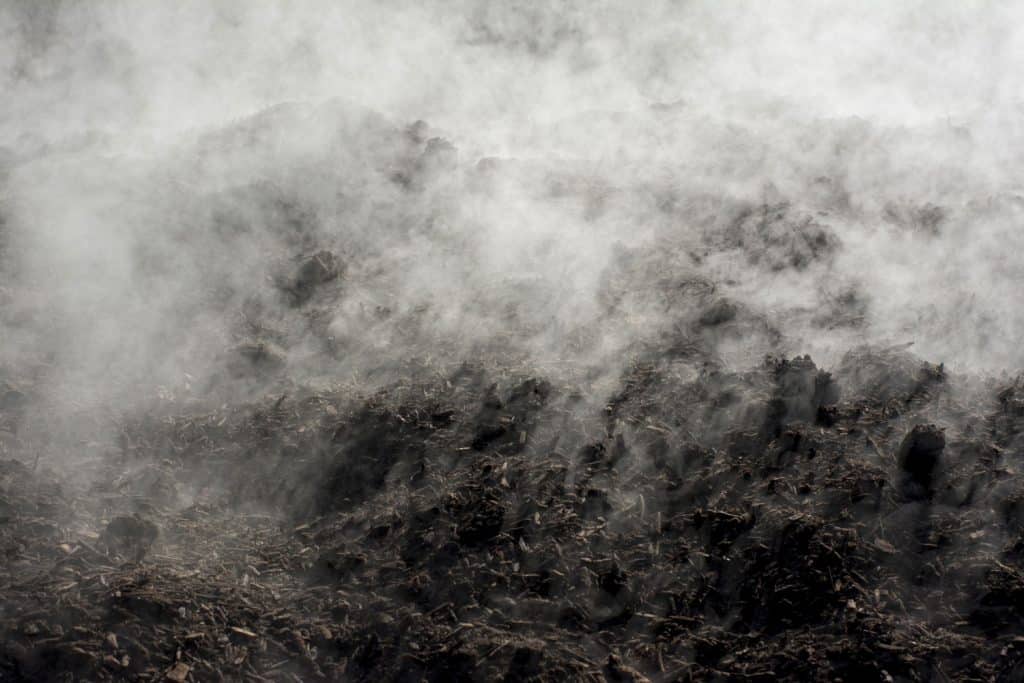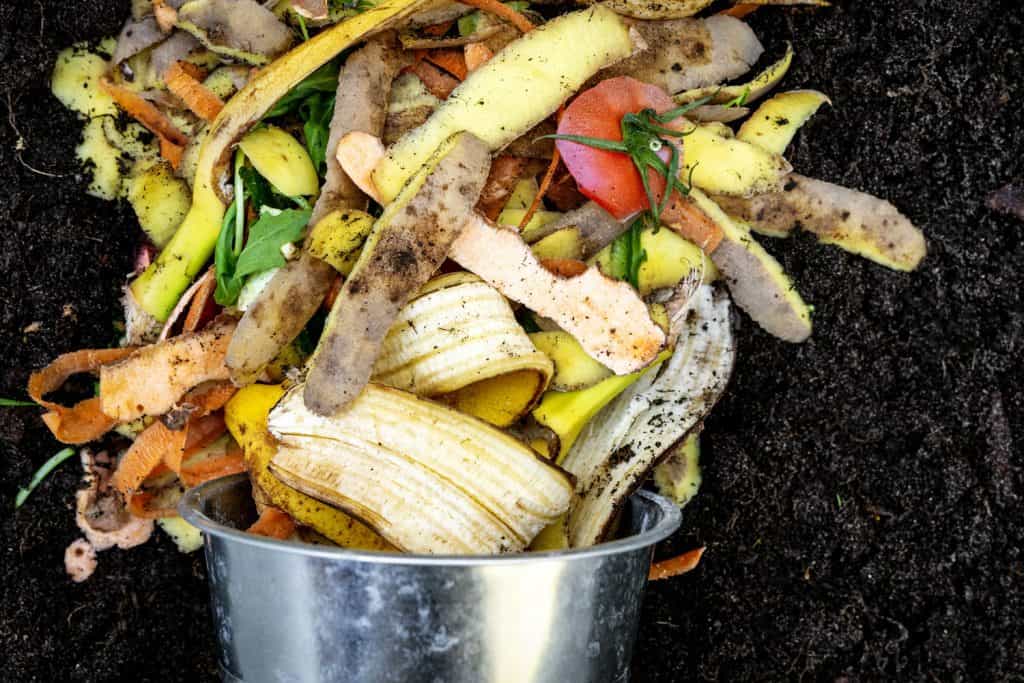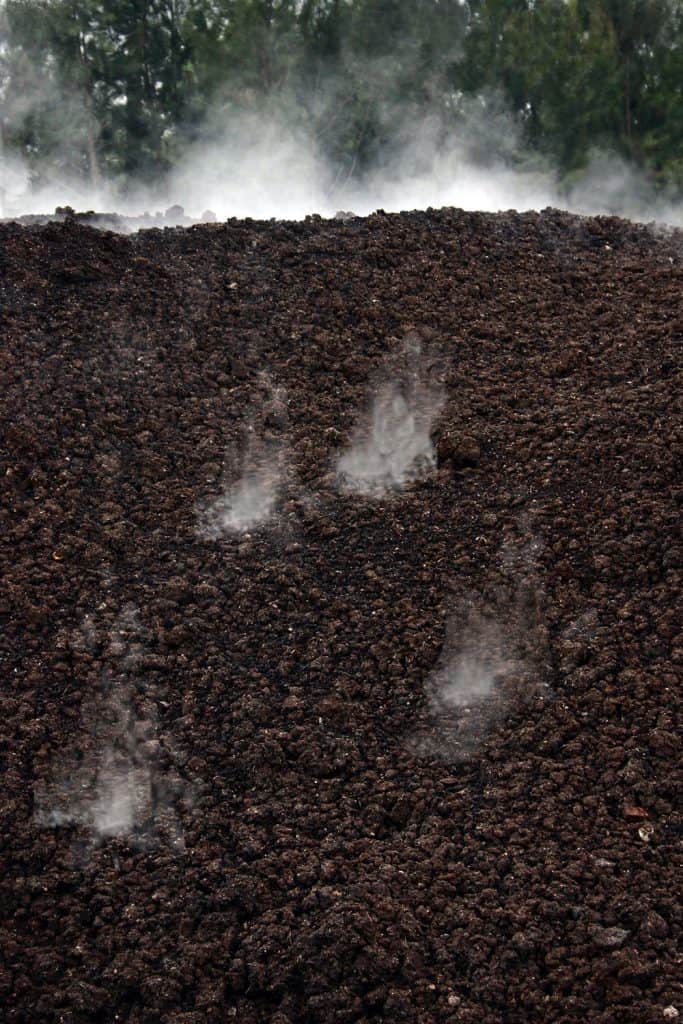Embarking on your composting journey, you're likely curious about just how hot your compost pile can get. As you aim to concoct a nutrient-dense buffet for your garden, ensuring the right heat level for your compost pile is crucial.
If you're a novice to the composting world, you might even wonder if a compost pile can get too hot. Buckle up, as we're about to explore these intriguing aspects.
Industrial-sized compost piles can sizzle to temperatures over 300 degrees, while your homemade compost pile will likely not surpass 200 degrees. The sweet spot for composting lies within the 120 to 160-degree range.
Anything higher risks snuffing out the beneficial bacteria and organisms that are vital to the composting process.
Having established the temperature profiles of compost piles and their ideal range, it's natural for you to have more queries brewing. We're going to delve deeper into this hot topic, uncovering the secrets that make compost decompose faster.
Additionally, we'll demystify why compost piles heat up and how to regulate their temperature. Finally, we'll shed light on the potential for compost fires and effective preventive measures. So stay tuned and continue reading to become a composting maestro!
![Vegetable leftovers and other fruit peels inside a compost bin, How Hot Does Compost Get? [And Can It Get Too Hot]](https://gardentabs.com/wp-content/uploads/2021/08/How-Hot-Does-Compost-Get-And-Can-It-Get-Too-Hot-683x1024.png)
How Hot Does Compost Get?
Compost can get as hot as 300 degrees, but this is unlikely for small compost piles. Large, industrial compost piles may reach temperatures this high. Small compost piles for your backyard garden or hobby farm will not achieve this temperature.
Hot composting helps break down the organic matter more quickly, but your compost pile can get too hot.
How Hot Is Too Hot For Compost?
Your compost pile should ideally be between 120 and 160 degrees Fahrenheit. This is hot enough to decompose the organic matter quickly.
When temperatures exceed this range, beneficial organisms and bacteria will begin dying off. You want this bacteria in your compost pile, so it is essential to prevent your compost pile from getting too hot.
What Happens When Compost Gets Too Hot?
Temperatures above 160 degrees will kill off beneficial microbes and reduce the amount of nitrogen in the soil.
The heat of a compost pile is important to break down and kill weed seeds, but your compost dirt will not contain the nitrogen that makes compost soil useful for your plants. This is vital to keeping your compost pile in good condition.

Will Hot Compost Start A Fire?
Residential composting is very unlikely to start a fire. The fire danger zone for compost piles occurs when temperatures reach or exceed 300 degrees Fahrenheit.
This temperature only occurs for very large compost piles that residential composters are unlikely to have. Industrial compost piles may reach several yards tall and wide, at risk of exceeding the danger zone for compost temperatures.
How To Prevent Compost From Getting Too Hot?
Larger compost piles will generate greater temperatures in the center of the pile. To prevent the compost from getting too hot, keep your compost pile small.
An ideal size for a residential compost is three feet wide, five feet long, and three feet tall. This should be large enough to generate hot compost without exceeding 160 degrees, killing beneficial microbes in the soil.
How To Cool Down A Hot Compost Pile
If you find that your compost pile is above 160 degrees, you may want to cool it down to protect the beneficial microbes. Turning the compost more frequently will help to bring down the temperature of the compost pile.
You can also add more brown organic matter to cool down your pile. Brown compost is material that comes from your yard, including fall leaves, pine needles, cornstalks, twigs, and paper.
How Can I Monitor The Temperature?
There are compost thermometers available that will reach the center of the pile. This will help you determine when the pile needs to be turned.
If the pile begins to reach the danger zone over 160 degrees, then the pile should be turned immediately. If the pile is starting to decrease in temperature and is below the ideal range, then you should turn the pile.
Backyard Compost Thermometer
Click here to see this compost thermometer on Amazon.
Why Is My Compost Hot?
The heat is a byproduct of the decomposing process, so heat is a sign that you have a healthy compost pile. Compost is supposed to be hot, but only in the ideal range of 120 to 160 degrees Fahrenheit.
If the temperature is too hot, your pile may be too large. You may also have a lack of brown organic matter.
How Does Moisture Affect Compost Heat?
Water has higher specific heat than dirt or other materials that will end up in your compost pile. This means moisture in your compost pile will cool off the overall temperature of the pile.
Drier compost without moisture will heat up faster during the hot daylight hours. Moisture is important for the decomposition process and helps to keep the temperature in check.
How Wet Should Compost Be?
Your compost pile should have the same consistency as a wrung-out sponge. To test the moisture level of the compost, you can squeeze a handful to see if any water drips out.
If there are more than a few drops of water, then the compost is too wet. If there are no drops, then you can add some water to the pile and turn it.

Why Is My Compost Turning White?
White is a normal color to see in your compost pile that indicates the organic matter is decomposing properly.
You might notice bacteria, fungi, or mold growing in the compost pile. This is a good sign that your compost pile is healthy.
For a more detailed answer to this question, check out this post: Why Is My Compost Turning White?
How Often Should You Turn Compost?
Compost should ideally be turned once or twice per week. The compost should sit undisturbed for at least three days before being turned again.
Turning the pile too often prevents the decomposition process from taking hold, including the growth of mold and fungi. Turning the compost too infrequently results in a cool compost pile.
Cold composting is also known as anaerobic, which takes longer to decompose into usable soil.
Anaerobic Vs. Aerobic Composting
Aerobic composting is the process that involves the regular turning of the pile. This is the kind of composting that produces heat and is the preferred method of composting.
Anaerobic composting is what usually occurs when you don't turn your compost pile. The compost stays cool and breaks down very slowly.
Anaerobic composting also produces pungent smells, while aerobic hot composting doesn't stink up your backyard.
What Will Make Compost Break Down Faster?

Aerobic composting is the process of providing enough oxygen and moisture for the decomposition process to take place. This decomposition process also creates heat as a byproduct.
You can create a functioning aerobic composting system by having the correct balance of about four parts brown for every one part of green compost. When this ratio is off, the decomposition will take longer to complete.
Gardener's Supply Company Compost Starter
Click here to see this compost start from Amazon.
What Counts As Brown Compost?
Brown compost is mostly plant material that is woody or dry. This includes any wood, such as twigs, bark, sawdust, or paper. Cardboard can also be composted as brown compost material.
Be sure to avoid any paper or cardboard that contains toxic inks. If you are unsure, it is best to recycle the cardboard and paper instead.
What Counts As Green Compost?
Green compost includes all of your food scraps from the kitchen. Grass clippings and trimmings from plants also fall under this category.
Coffee grounds are classified as green despite the rich dark color. Coffee grounds are high in nitrogen and must be balanced with a proper amount of brown compost.
There are different methods of composting that may be more suited to your goals and location. For an extended discussion about different types of compost, check out this post: 6 Types Of Compost You Should Know
In Closing
Compost needs moisture and oxygen to thrive. This speeds up the decomposition process, which creates heat as a byproduct.
This heat should ideally be at temperatures between 120 and 160 degrees Fahrenheit.
If you exceed this temperature, it can kill the beneficial bacteria in your compost pile. If the temperature is too low, then your pile becomes anaerobic. Anaerobic composting is slow and smelly, so hot composting is the preferred method.


